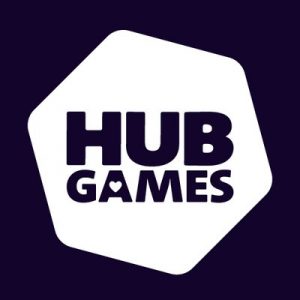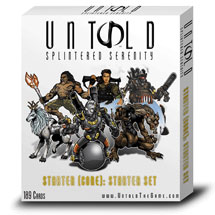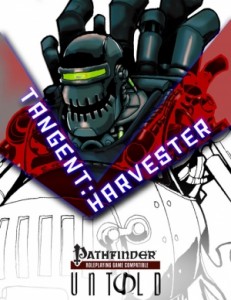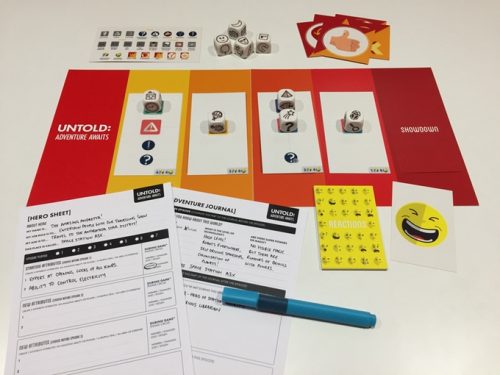Original Publisher of Rory’s Story Cubes Transitions to Hub Games
22 Jan
Posted by David Miller as Modern Board Games, RPGs
 The Creativity Hub, the Irish firm responsible for publishing Rory’s Story Cubes and The Extraordinaires Design Studio is shifting focus from the educational market exclusively to tabletop games. With that comes a new name, Hub Games.
The Creativity Hub, the Irish firm responsible for publishing Rory’s Story Cubes and The Extraordinaires Design Studio is shifting focus from the educational market exclusively to tabletop games. With that comes a new name, Hub Games.
What the company will keep doing, however, is producing products with a unique sensibility.
Hub Games aims to publish games that foster discussion between players at the table and beyond; games with heart. By encouraging self-expression through play and having gamers reflect on the choices they make, Hub Games looks to push past the idea of games being simple entertainment.
Its two latest releases are Blank and Untold: Adventures Await. Blank is a card game reminiscent of Uno, except that the cards and game rules are modified by the players with each play. Thus, over time each card deck becomes a reflection of the people who’ve played with it. Untold: Adventures Await is a storytelling game, a kind-of cooperative RPG in which participants describe a series of adventures using Rory’s Story Cubes in a structure of scenes, episodes, and seasons.
The rights to Rory’s Story Cubes were sold by the company last year to Asmodee.
- Comments Off on Original Publisher of Rory’s Story Cubes Transitions to Hub Games
Untold: The Rory’s Story Cubes Adventure Roleplaying Game
16 May
Posted by David Miller as Modern Board Games, RPGs
Rory’s Story Cubes, those symbol-covered dice meant to inspire creative storytelling are set to become the basis for a new cooperative roleplaying game. The company behind the Story Cubes, Belfast-based The Creativity Hub, launched this morning on Kickstarter Untold: Adventure Awaits, a game meant to offer a “deeper level of storytelling while also being accessible to as wide an audience as possible.”
The game has players creating individual characters and building a story in five scene stages—danger, intrigue, confrontation, revelation, and showdown—which together comprise an “episode”. At each stage, a scene tile will provide the overall structure. For example, the chosen danger tile might indicate that someone is being attacked, with fill-in space for where and with what. Then players roll the Story Cubes to fill in the details.
Also part of the game are reaction cards and toolkit cards. Reaction cards are used for resolving character actions. The toolkit cards allow players to take special actions in developing the story. For example, a flashback card allows a player to incorporate elements from a previous episode and an “and” card gives a player the ability to superimpose their idea on to another player’s concept.
The base game, available for a £20 ($26) pledge, includes one set of nine Rory’s Story Cubes, an episode board, six alternative scene tiles for each stage, reaction cards, toolkit cards, player aids, an adventure journal, and hero sheets. For a £28 ($36) pledge, backers get, in addition to the base game, one set of licensed cubes (Doctor Who, Looney Tunes, Scooby Doo, Moomin, or Adventure Time). Or for £160 ($206), backers get everything. That is, every Rory’s Story Cube ever released, including the 3-cube Mix Sets that were not previously sold in the United States.
Assuming The Creativity Hub hits its funding goal of £10,000 (around $13,000) for the Untold project—a pretty safe bet—the company plans to deliver games to backers in October of this year, followed by a formal launch at Essen Spiel. Of course, the project also has stretch goals. The first, at £12,000 ($16,000), would add a set of Batman Story Cubes to the base game.
- Comments Off on Untold: The Rory’s Story Cubes Adventure Roleplaying Game

Untold is an RPG system that uses nothing but cards. You create your characters using cards, the GM has a deck of cards for encounters, and you even keep track of status ailments, etc… with cards. The Splintered Serenity starter pack comes with enough cards for 6 characters and a GM. A pretty impressive thing. The only extra thing you’ll need to play is dice.
The set comes with quick start rules to get you going, but I’d highly recommend reading the free primer on their website for a more in-depth look at how the game is played. There’s even some videos you can watch.
So on to the review. Let’s start right off with a gut-check. I really like Untold. I love the simplicity, I love the portability, and I love how you can easily adapt just about any setting you choose for use with Untold cards. I like the idea of buying extra cards to flesh out your game, but really not needing to. I even love how easy it is to create your own cards to use with the game for in-depth customization.
The first thing you need to do when playing Untold is create your character. This is done by the GM letting you know how may UP you can spend to create your character. Once you have this number you can have a character ready for play in around 5 minutes. You select a race, then start adding Aspect cards and Power cards. Aspect cards describe your character basic stats: Body, Mind, and Spirit. Power cards are the real meat of character creation, allowing you to add weapons, special abilities, spells, and more. Each type of card, including your race, has a cost that adds up to the total UP allowed by the GM. Any unused points you have go into a swap pool for later use in the game to be spent swapping cards into your character.
Note that a GM will also be building their own deck with Minion cards.
Combat plays pretty quickly, and flows well. Characters end up losing cards from their character deck when they’re injured, which is a really cool way to handle things. Experience is handles by giving out UP, which can be used to beef up characters with more cards.
There’s a wealth of information to be had on the Untold website. They’ve got plenty of fiction and information about their settings, rules for playing a battle game with your Untold cards, and more.
In the end, you get a lot of value out of the approximately $30 you’ll spend on a starter box of Untold. If you’re into RPGs, I highly recommend picking it up and at least giving it a shot.
*A copy of the Untold: Splintered Serentiy starter pack was provided by Wandering Man Studios for this review.
- Comments Off on Second Look—Untold

Ignitus Innovation, publishers of Untold, have just released a Tangent for the Pathfinder RPG system called Harvester.”
“What’s a Tangent,” you might ask?
Ignitus describes them as: “Tangents are a line of simple, straightforward and super-awesome mini-adventures for your Pathfinder (or Untold) game! Designed to be easy to slip in between two adventures, in the middle of an existing adventure, or even to be used as the stepping off point for a brand new adventure, Tangents are ‘plug-and-play’, ‘quick-and-dirty’ RPG goodness!”
As stated in that description, you can also use this Tangent in your Untold games.
Here’s what the book includes:
- One (1) new Pathfinder Creature: the Harvester
- One (1) new Pathfinder NPC: Buzzsaw (and advanced Harvester “build”)
- A tangent for 5th level characters – complete with Overview, Background, Encounter Setup, and Monster Tactics sections!
- A section on Expanding the Tangent into a full-fledged adventure
- 6 pages, brimming with beautiful, full-color art
I love the idea of bite-sized adventures, and it’ll be cool to see what else Ignitus comes up with in this series. I don’t have any Pathfinder material, but I’m interested to see how well this will work with my Untold stuff.
Tangent: Harvester is available from DriveThruRPG for $1.
- Comments Off on Pathfinder Tangent: Harvester
Trending
- Massdrop.com
- Oh the Irony—Illuminati Card Game Continues to Inspire Conspiracy Theorists
- Home
- Footprints, an Educational Ecology Game
- USPS Adds Board Game Flat Rate Box
- Baila, the Estonian Drinking Card Game
- Crystal Caste Wins Dice Patent Suit Against Hasbro
- Mirror Game, Red and Blue
- Are Board Games Dangerous?
- The Truth About Dominoes On Sunday in Alabama
Archives
Most Popular Articles
- Oh the Irony—Illuminati Card Game Continues to Inspire Conspiracy Theorists
- The 20 Most Valuable Vintage Board Games
- The Truth About Dominoes On Sunday in Alabama
- Sequence Game, and Variants
- USPS Adds Board Game Flat Rate Box
- Baila, the Estonian Drinking Card Game
- The 13 Most Popular Dice Games
- Are Board Games Dangerous?
- Guess Who? The Naked Version
- What Happened to the Jewel Royale Chess Set?
Recent Posts
- Toy Fair 2019—Breaking Games
- Talisman Kingdom Hearts Edition
- Toy Fair 2019—Winning Moves
- Toy Fair 2019—Games Workshop
- Toy Fair 2019—Star Wars Lightsaber Academy
- Toy Fair 2019—Stranger Things Games
- Toy Fair 2019—HABA
- Licensing Roundup
- Game Bandit
- 2018 A Difficult Year For Hasbro But Not For D&D Or MtG
Recent Comments
- on Toy Fair 2019—Winning Moves
- on Game Bandit
- on Second Look—Dungeons & Dragons Waterdeep Dragon Heist
- on Crowdfunding Highlights
- on Beyblade SlingShock
- on Game Bandit
- on Game Bandit
- on Watch This Game!, the Board Game Review Board Game
- on Second Look—Vampire: The Masquerade 5th Edition
- on Palladium Books Loses Robotech IP License, Cancels Five-Year-Overdue Robotech RPG Tactics Kickstarter





